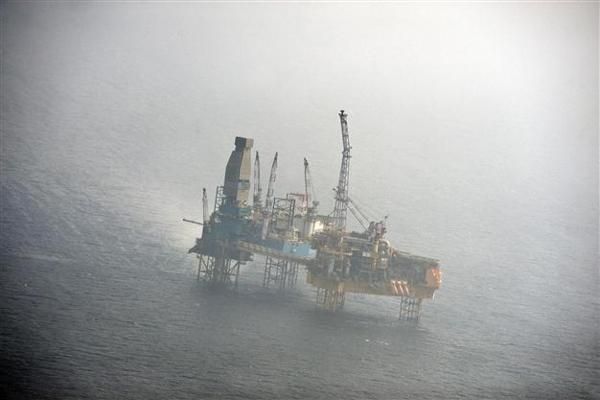Total plans relief wells to stop North Sea gas leak
LONDON - Agence France-Presse


An aerial picture shows Total's Elgin Wellhead Platform in the North Sea off the Scottish coast March 28, 2012. Reuters photo
Total is preparing to sink two relief wells to stop a gas leak at a North Sea platform in parallel with a plugging operation, a senior company executive said Friday.Philippe Guys, managing director of Total's British exploration arm, also revealed that concerns with the well off the east coast of Scotland that is leaking a cloud of gas first emerged a month ago.
In a news conference in Aberdeen five days after the Elgin platform was evacuated, Guys said Total had suspended operations on two floating drilling rigs so they can be used to drill relief wells if required.
The French energy giant has seen eight billion euros ($10 billion) wiped off its stock value since the 238 crew on the rig were evacuated on Sunday.
Its share price has dropped around eight percent since the start of the leak, which the company says is the most serious problem it has faced in the North Sea.
"With respect to stopping the leak we have launched two main actions which are progressing in parallel," Guys said.
"The first is to carry out the well kill operation using a floating support.
"The second is to drill two relief wells. To that end we have suspended operations on two of our drilling rigs to make them available for work on the relief wells." 'Killing' the well would involve pumping mud into it at high pressure.
Guys said that when Elgin was evacuated all the other wells on the platform "were left in a safe condition".
He said "irregular pressure" on the problem well was first observed on February 25 and an attempt to deal with it was made in the following weeks by pumping it full of high-density mud.
"During that process on March 25 we observed a sudden pressure increase followed by escape of mud and then gas," Guys said.
He confirmed that the gas was emerging from the deck of the platform, not below the sea.
As for the cause of the leak, Guys said, "At this time there is no evidence of human error." Officials also revealed that aerial surveillance had revealed that a flare left burning on the platform when it was evacuated is diminishing.
The presence of the flare, which was left alight to burn off gas in the system, has raised fears of an explosion.
Ahead of the news conference, Total said it was considering dropping water from a helicopter or spraying nitrogen to extinguish the flare.
Charles Hendry, Britain's energy minister, praised the speed of the evacuation, which was completed in three and a half hours.
But he warned that efforts to stop the leak could take time, and stressed that openness was essential.
"The issues that can be addressed quickly will be addressed quickly," he said at the news conference.
The last major accident in the North Sea was in 1988, when the Piper Alpha oil platform operated by the US-based Occidental Petroleum exploded, killing 167 people.
Total is desperate to avoid the financial and reputational damage caused to BP following the Deepwater Horizon explosion, which killed 11 crewmen and caused 4.9 million barrels of oil to gush into the Gulf of Mexico, triggering the worst environmental disaster in US history.
